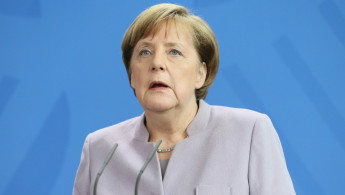German hard-right enter parliament for first time since the Second World War
Chancellor Angela Merkel has won a fourth in Germany's general election on Sunday, but there is dismay as a hard-right party picked up seats for the first time since the Second World War.
Merkel has been in power for 12 years and won comfortably again with a double-digit lead with a 33 percent share of the vote with her conservative Christian Union (CDU/CSU) bloc, according to exit polls.
Centre-left Social Democrats and their candidate Martin Schulz came in a distant second with about 20-21 percent.
But the German establishment was rocked with the performance of the anti-Islam, anti-immigration Alternative for Germany (AfD) which picked up around 13 percent of the vote, making it the country's third biggest political force.
The four-year-old party with links to the far-right French National Front and Britain's UKIP has been shunned by Germany's mainstream.
It is now headed for the opposition benches of the Bundestag lower house, but will be boosted by increased visibility and state financing.
Foreign Minister Sigmar Gabriel branded "real Nazis" entering the Bundestag for the first time since the Second World War.
"This Alternative for Germany is no alternative. They are a shame for our nation," former European Parliament chief Schulz told a rally in Berlin on Friday.
Another three parties cleared the five-percent hurdle to representations: the liberal Free Democrats (around ten percent), anti-capitalist Left Party and the Greens (both at about nine percent).
As Merkel failed to secure a ruling majority on her own, the process of coalition building was shaping up to be a thorny, potentially months-long process.





 Follow the Middle East's top stories in English at The New Arab on Google News
Follow the Middle East's top stories in English at The New Arab on Google News


